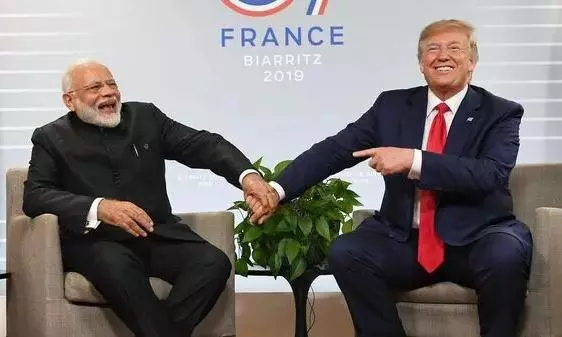
Trump returns: What it means for India-US trade and strategic ties
text_fieldsWith Donald Trump re-entering the White House, his administration is expected to shift US policies in ways that will deeply impact its relationship with India. During his previous term, Trump’s foreign policy decisions were marked by a complex blend of trade tensions and strengthened defence ties with India.
His return to office raises questions about the future of India-US relations, particularly in terms of economic policies, technology partnerships, and regional security interests. Indian policymakers, businesses, and diplomats are watching closely, preparing to navigate both opportunities and potential challenges.
One of India's most immediate concerns is Trump’s proposed tariff policies. In his first term, Trump’s “America First” approach to trade led to heightened tariffs, some of which affected Indian exports. Pharmaceuticals, textiles, and information technology (IT) services were hit hard by tariff increases and visa restrictions.
India has a robust export relationship with the US, which is one of its largest trading partners. However, Trump’s emphasis on trade deficits may result in renewed scrutiny of this trade balance, as his administration is likely to focus on reducing the US trade deficit.
Trump has already floated the idea of implementing a 20% tariff on all imports, and a 200% duty on car imports—policies that, if enacted, could have ripple effects on Indian industries, especially automotive and technology manufacturing. The government may have to negotiate carefully to secure exemptions or create alternative agreements that protect India’s economic interests.
Despite these potential frictions, Trump’s strong stance against China could indirectly benefit India. If the US continues to view China as an economic and strategic rival, India may be positioned as a key partner in the Indo-Pacific region. This dynamic could encourage the Trump administration to deepen trade relations with India, albeit with a possible focus on strategic sectors like defence and technology.
Another significant aspect of the India-US relationship under Trump is technology and talent mobility. In his previous term, Trump implemented restrictive immigration policies that affected the H-1B visa program, which Indian tech workers heavily rely on.
However, Trump has suggested streamlining the green card process for foreign graduates from US universities, a move that could benefit Indian students and professionals. For India, this change could offer a clearer path for talent working in US tech companies to stay long-term, thus supporting innovation and knowledge exchange between the two nations.
Indian tech firms operating in the US could benefit if the Trump administration ultimately supports these skilled workers, helping bolster India’s tech footprint in America.
Beyond immigration, Trump’s return may also accelerate discussions on technology partnerships, especially in high-stakes areas like artificial intelligence (AI), space exploration, and defence technology.
Indian and American companies have collaborated in these fields, and Trump’s inclination to support private-sector partnerships could further these initiatives. Some Indian policymakers are optimistic that Trump’s interest in companies like Tesla and SpaceX could lead to strategic investments that advance India’s technological infrastructure, creating mutually beneficial partnerships.
Under Trump’s previous administration, India-US defence ties reached new heights, particularly with the signing of the Basic Exchange and Cooperation Agreement (BECA), which expanded intelligence sharing between the two countries.
Trump was instrumental in pushing for closer strategic ties with India as a counterbalance to China, which was increasingly asserting its influence in the Indo-Pacific. With China’s presence continuing to grow in the region, Trump’s return could see a renewed focus on defence cooperation with India, positioning it as a vital partner in regional stability.
India’s security interests align well with Trump’s approach to the Indo-Pacific. His administration is expected to strengthen military collaborations and joint exercises like the Malabar naval exercise, which includes the US, India, Japan, and Australia.
This cooperative stance is likely to persist, with Trump aiming to create a network of allies in Asia that can collectively counterbalance China’s influence. This could include advanced arms sales, which would bolster India’s defence capabilities in alignment with Trump’s policy of supporting allies with US-manufactured military equipment.
However, India may face the challenge of balancing its relationship with the US and maintaining a degree of diplomatic independence. While Trump’s policies offer India substantial support in countering regional threats, some policymakers advise caution in aligning too closely with a US administration that has demonstrated a transactional approach to alliances.
Trump’s approach to South Asia is likely to have repercussions for India’s regional policies, particularly in relation to Pakistan and the sensitive Kashmir issue. During his last term, Trump offered to mediate between India and Pakistan on Kashmir—a suggestion that India firmly rejected, insisting that Kashmir is a bilateral matter.
If Trump revisits this offer, India may again find itself resisting external intervention in this complex regional issue.
India’s stance on Kashmir remains one of strict non-interference, and any renewed offers from Trump to mediate may strain diplomatic relations. However, his administration’s strong position on countering terrorism aligns with India’s own security concerns regarding Pakistan. This shared focus could show that the two countries are cooperating on anti-terrorism efforts, even if they differ on the Kashmir issue.























